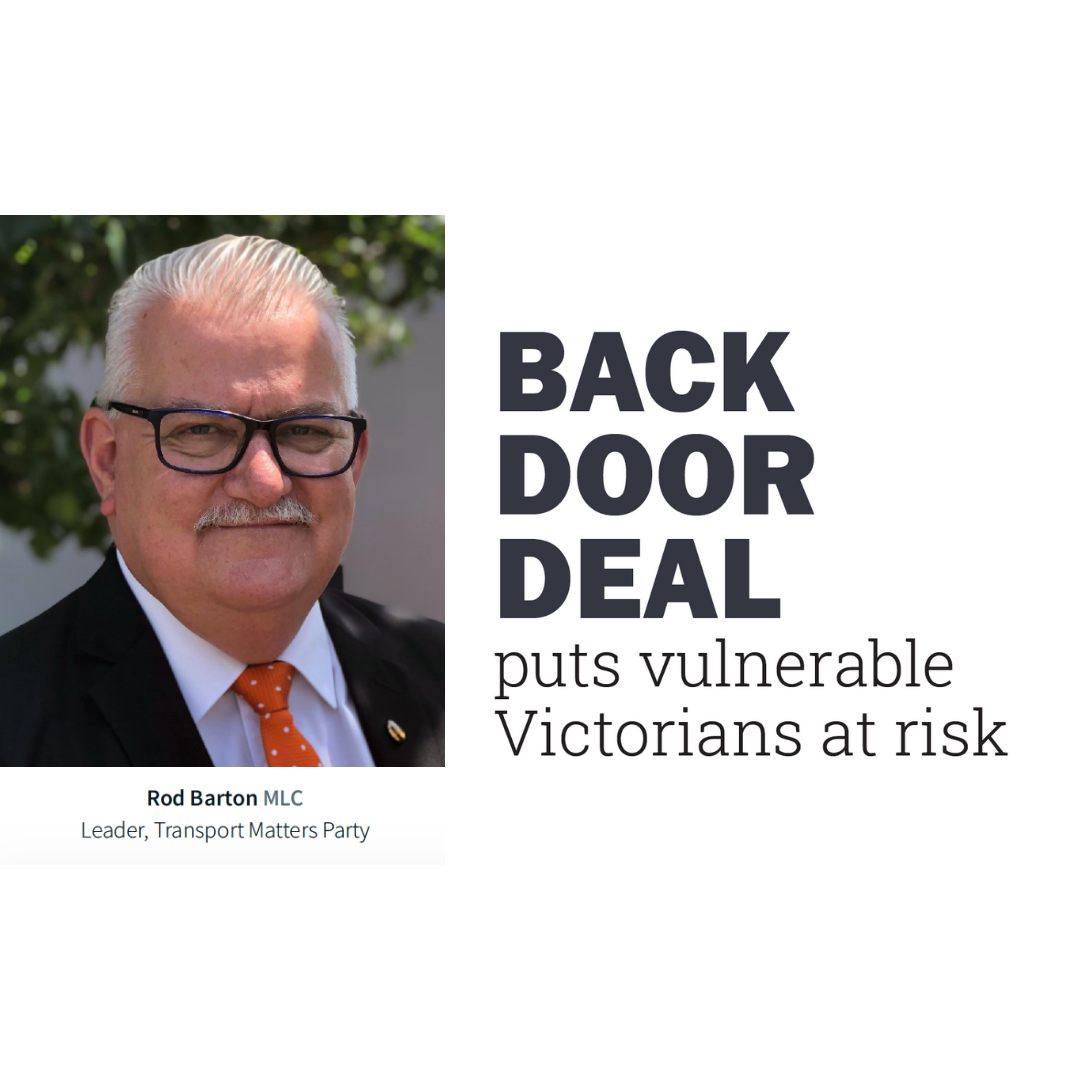The partnership between the government and Uber was negotiated in secret, without proper industry and stakeholder consultation or a financial impact assessment on the taxpayer-funded scheme.
I believe that this decision will put some of Victoria’s most vulnerable people at risk. This ‘partnership’ deal means disabled, frail and impaired people will be transported in Uber cars that don’t have tamper-proof security cameras or fixed GPS tracking and are driven by people who are not trained or accredited to care of vulnerable people with special needs. The details of this sham ‘partnership’ between the government and Uber is deemed commercial in confidence and lacks proper probity and governance. According to the Department of Transport which oversees the CPVV, the decision was based on a limited trial conducted during the height of the pandemic in the Geelong area involving around 170 trips. This was during a period when the total number of trips was reduced by up to 90%. How is the data collected in any way reflective of normal circumstances and sufficient to make a judgement call? Uber’s predatory surge pricing will leave many disadvantaged people paying more; and there is no doubt that Uber will ‘cherry-pick’ jobs which will leave people requiring vehicles with wheelchair and other specialist equipment waiting on the kerb. It costs around $90,000 to put a wheelchair capable taxi on the road and around thousands every year to keep it running – it’s a specialist area requiring detailed driver training and ongoing compliance costs. The backdoor deal with Uber means that for many operators, this investment will no longer be viable, forcing them off the road. In some country areas that also means wiping out the regulated taxi service, leaving communities stranded. The changes to the MPTP scheme has also opened it up to major rorting, as it is a requirement that the cardholder be in the vehicle to legitimately claim the travel subsidy. When using taxis, MPTP cardholders are required to present their card to the driver to process the subsidy. Whereas when using the Uber app, cardholders are only required to enter their card details once and the information is saved for all future trips. It is not uncommon for people to allow others to make bookings through their personal Uber account. One can foresee how easily this will be misused. My greatest fear though is for the safety of passengers. The government decided that rideshare vehicles don’t need regulated security cameras such as those required in taxis, which means there is a substantial safety and injury risk. You can’t just let an occasional Uber driver pick up a person with special needs. Uber has also gone to great lengths, spending up big on high-priced lawyers to say it doesn’t employ or isn't responsible for its drivers – if a special needs passenger is injured or worse, abused or attacked, the victim will have no recourse. What’s more, sensitive information about the special needs passengers is disclosed via the Uber app, which is an unacceptable breach of government policy. And then there is the fact that a large part of taxpayer dollars used to support the MPTP scheme will now go offshore in Uber commissions and its tax-dodging operations. This organisation has defied regulatory responsibility at every turn – from operating illegally, denying its drivers rights under workplace laws, refusing to provide answers to the Australian Tax Office, hindering local police investigations by redirecting queries to their main office in California and even dodging questions at a Parliamentary Inquiry. I have asked Minister for Transport, Ben Carroll, to table the risk assessments, Ministerial briefs and financial agreements with Uber in Parliament. The Multi Purpose Taxi Program is funded by the taxpayer to support people who are vulnerable and have special needs – it must be managed transparently and not used as a back-door cash cow for a company such as Uber that repeatedly argues that it is not responsible for its drivers. Rod Barton MP Leader, Transport Matters Party More news in our February 2021 Issue here.
1 Comment
17/2/2021 03:44:10 pm
Given the negative balance in the bank accounts of most state governments, I see this as being inevitable and that's before even considering that the NDIS will have no such scruples about their selection process either. The two main areas of concern are the proliferation of used WAVs on the market (the Japanese imports are scary indeed) & the absence of age limits on these vehicles, plus the complete ignorance in the selection criteria of the need for a provider that has avenues of communication for driver, passenger and regulator, plus all of the governance enquiries such as a nominated govt reference person, is astounding. Unfortunately with the eagerness of state governments to deregulate and to outsource, the only hope is to convince the bureaucrats of a need to install a third party gateway to screen all applicants and avoid a repeat of this Victorian disaster.
Reply
Leave a Reply. |
NewsDRIVE NOW reports on various topics regarding the Archives
December 2022
Categories
All
|
DRIVE NOW Magazine is published by Trade Promotions Pty Ltd, Ashwood VIC Australia. © 2022 DRIVE NOW |


 RSS Feed
RSS Feed